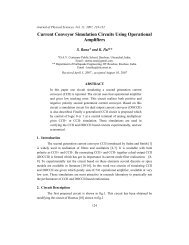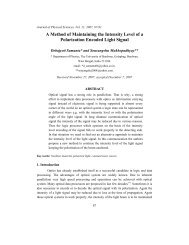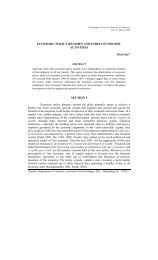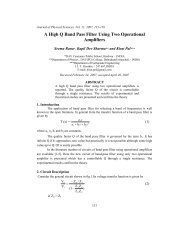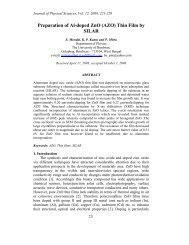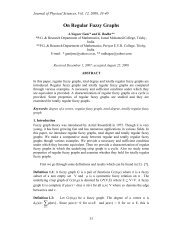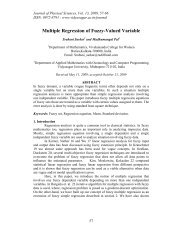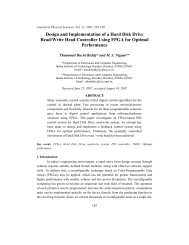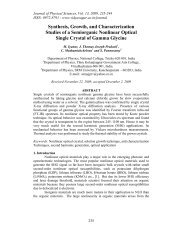VIDYASAGAR UNIVERSITY JOURNAL OF COMMERCE
VIDYASAGAR UNIVERSITY JOURNAL OF COMMERCE
VIDYASAGAR UNIVERSITY JOURNAL OF COMMERCE
Create successful ePaper yourself
Turn your PDF publications into a flip-book with our unique Google optimized e-Paper software.
CORPORATE GOVERNANCE AND TRANSPARENCY SCENARIO IN ASIA<br />
not dependent on pay-for-performance. Second, we consider the advantages of relying on the<br />
basic democratic idea of division of power in CG. Third, we can learn from how rules of<br />
succession prevalent in the political sphere can be applied so as to devise better governance<br />
rules. And, fourth, we propose that CG can be improved by relying on institutionalised<br />
competition in core areas of the firm.<br />
CG is not just “compliance” but goes further, as we sometimes describe it as “beyond<br />
compliance towards building a good governance culture, instilling an environment of trust<br />
and confidence.” CG stems from the culture and mindset of management and cannot be<br />
regulated by legislation alone; too many legal provisions and their intricacies would make<br />
the real objective worthless. Perhaps the most important challenge we face, at present, is the<br />
mindset of the people and the organizational culture. This change should come from within,<br />
not by force. The government or the regulatory agencies, at best, can provide certain<br />
environment which will be conducive for such a mindset taking place but the primary<br />
responsibility is of the ‘managerial people’ (the elite and more powerful class) especially the<br />
members of the board of directors and the top management. Further, the spirit of CG is more<br />
important than the form—substance is more important than style. Ethical values are the<br />
essence of CG and these will have to be clearly articulated, and systems and procedures<br />
devised so that these values are practiced ‘willingly’ by the corporate world. Inevitably, the<br />
question of CG boils down to “morality and respect for the shareholders’ right”. We are of<br />
the firm opinion that some initiatives have been taken by various national agencies in Asia,<br />
but much work still remains to be done (see Table-8), and the ethos of CG culture has yet to<br />
sink in. Full convergence with international accounting and audit standards, better protection<br />
of minority investors, stronger enforcement of existing laws & regulations, actual<br />
independence of the supposedly independent, non-executive directors, etc., are some of the<br />
grey areas requiring improvements in CG scenario in the Asian countries. In nutshell, we can<br />
say that CG scenario in Asia remains at best a gradual work-in-progress, and how soon it<br />
will attain perfection only future will tell us.<br />
Table-8: Shareholder Rights--a Work-in-progress in Asia<br />
Question<br />
China<br />
Hong Kong<br />
India<br />
Indonesia<br />
Japan<br />
Korea<br />
Malaysia<br />
Philippines<br />
Singapore<br />
Taiwan<br />
Thailand<br />
Can minority shareholders easily elect an N M M N N N N N M M N<br />
independent executive director?<br />
Are pre-emption rights for minority N M M L N M M N M M S<br />
shareholders family protected?<br />
Is there a trend of large listed companies S Y M N N N N N N N S<br />
voting by poll?<br />
[Keys: Y = Yes; S = Somewhat; M = Marginally; N = No]<br />
24 Vidyasagar University Journal of Commerce





